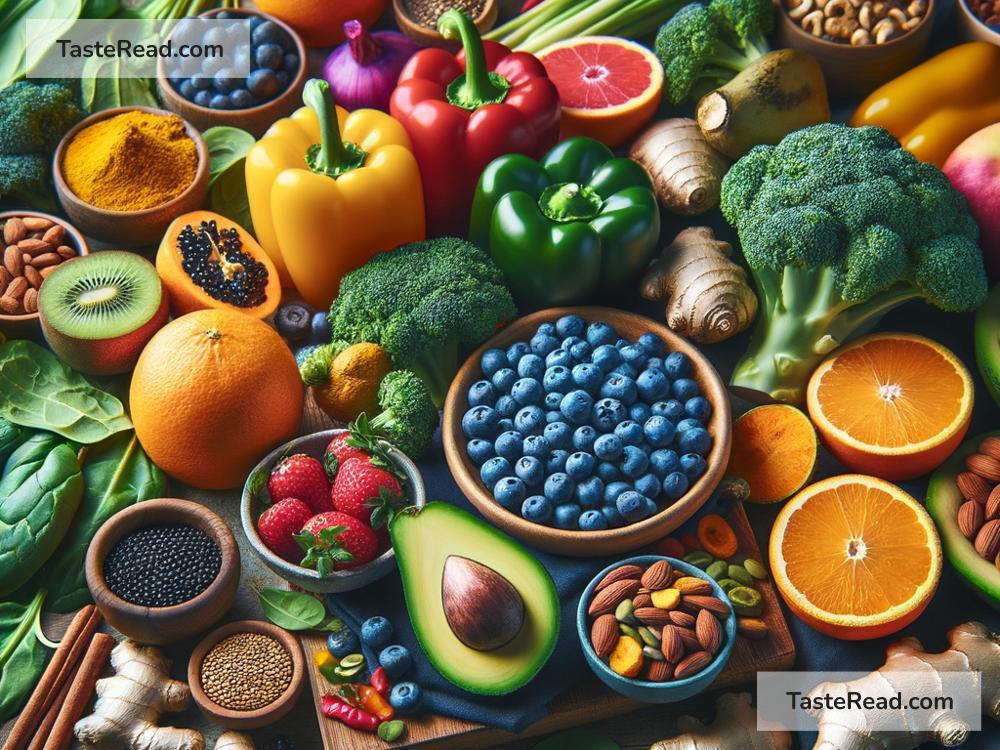Foods for Enhancing Anti-Inflammatory Response: Simple Ways to Help Your Body Heal
Inflammation is the body’s natural response to injury or infection, helping it heal and fight off harmful invaders. However, when inflammation becomes chronic, it can lead to health problems like arthritis, diabetes, heart disease, and even depression. Fortunately, the foods you eat can play a big role in controlling inflammation and supporting your body’s natural anti-inflammatory response. Let’s take a closer look at some of the simplest and healthiest options to add to your diet.
What Is an Anti-Inflammatory Diet?
An anti-inflammatory diet focuses on foods that reduce inflammation in the body while avoiding those that trigger it. Think of it as eating for balance—helping your body heal itself naturally by providing nourishing, wholesome ingredients that promote wellness. Research has shown that eating anti-inflammatory foods can improve energy levels, support overall health, and even reduce the risk of chronic diseases.
Now, let’s explore some of the top foods you can include in your meals for better inflammation control.
1. Fruits: Nature’s Sweet Healers
Fruits are loaded with vitamins, antioxidants, and nutrients that help your body fight inflammation. Bright-colored fruits like berries, oranges, cherries, and grapes are especially powerful.
- Berries: Blueberries, strawberries, raspberries, and blackberries are rich in antioxidants called anthocyanins, which reduce inflammation and protect cells.
- Oranges: Packed with vitamin C, oranges strengthen your immune system and calm inflammation.
- Cherries: Tart cherries, in particular, have compounds that ease inflammation and may even reduce pain in arthritis sufferers.
Tip: Add fruits to your smoothies, oatmeal, or snack on them fresh for a healthy treat!
2. Vegetables: The Anti-Inflammatory Powerhouses
When it comes to vegetables, the darker and brighter the color, the better. Leafy greens and cruciferous vegetables offer powerful benefits.
- Spinach and Kale: These leafy greens are packed with vitamins A, C, and K, as well as antioxidants that fight inflammation.
- Broccoli: Broccoli contains sulforaphane, a compound shown to reduce inflammation in the body.
- Bell Peppers: Red, yellow, and orange peppers are high in antioxidants and vitamin C, making them great for your joints and immune health.
Tip: Steam, sauté, or roast veggies to preserve their nutrients while bringing out their natural flavors.
3. Fatty Fish: Omega-3 Heroes
Fatty fish like salmon, mackerel, tuna, and sardines are rich in omega-3 fatty acids, which reduce inflammation. Omega-3s are particularly helpful for heart health and joint pain.
Research has found that eating fatty fish two or three times a week can moderate inflammation levels in people with chronic conditions. If you can’t eat fish regularly, consider a high-quality fish oil supplement.
Tip: Grill or bake fish with your favorite herbs for a healthy and delicious meal.
4. Nuts and Seeds: Small Snacks with Big Benefits
Nuts and seeds are fantastic sources of healthy fats, fiber, and antioxidants. Almonds, walnuts, flaxseeds, chia seeds, and sunflower seeds are all excellent options.
- Walnuts: Rich in omega-3s, walnuts help reduce inflammation, especially in the brain.
- Flaxseeds and Chia Seeds: Both are high in alpha-linolenic acid (ALA), a type of omega-3 that benefits the heart, skin, and joints.
Tip: Add nuts and seeds to yogurt, salads, or use them as a topping for your smoothies!
5. Whole Grains: Better than Refined Carbs
Refined carbohydrates, like white bread and sugary snacks, can cause inflammation in the body. Whole grains, such as brown rice, quinoa, oatmeal, and barley, provide fiber and nutrients that help stabilize blood sugar and fight inflammation.
Tip: Pair whole-grain options with vegetables and lean protein for balanced meals.
6. Spices and Herbs: Flavorful Anti-Inflammatory Boosters
Certain spices and herbs don’t just enhance the taste of food—they also provide powerful anti-inflammatory properties.
- Turmeric: The bright yellow spice contains curcumin, an active compound shown to fight inflammation and boost brain health. Combine turmeric with black pepper to improve its effectiveness.
- Ginger: Known for its soothing effects on digestion, ginger also contains compounds that reduce inflammation. Try fresh ginger in teas or stir-fries.
- Garlic: Garlic has sulfur compounds that fight inflammation and support immune health.
Tip: Experiment with spices in soups, stews, marinades, or even beverages like tea for added benefits.
7. Healthy Oils: Better Choices for Cooking
Not all fats are bad. Healthy oils like olive oil and avocado oil are excellent sources of monounsaturated fats that ease inflammation.
- Extra Virgin Olive Oil: Rich in healthy fats and antioxidants, olive oil is a staple of the Mediterranean diet and is known for its heart-friendly effects.
- Avocado Oil: Similar to olive oil, avocado oil has anti-inflammatory benefits and is great for cooking at higher temperatures.
Tip: Use these oils sparingly in dressings, marinades, or cooking instead of processed vegetable oils.
What to Avoid
While adding anti-inflammatory foods to your diet, it’s equally important to avoid inflammation-triggering foods. Limit or skip these items:
– Processed foods and refined sugars
– Fried foods and fast food
– Red meat and processed meats like bacon and sausages
– Sugary drinks and sodas
Conclusion
Taking care of your body starts with what you put on your plate. Including more anti-inflammatory foods like fruits, vegetables, fatty fish, nuts, and spices in your diet can help reduce inflammation and support long-term health. Small, consistent changes to your eating habits can make a big difference in how you feel and how well your body functions.
So, the next time you’re grocery shopping, fill your cart with colorful produce, wholesome grains, and healthy oils to give your body the nutrients it needs to thrive. Eating well doesn’t have to be complicated, but it does have the power to heal!


